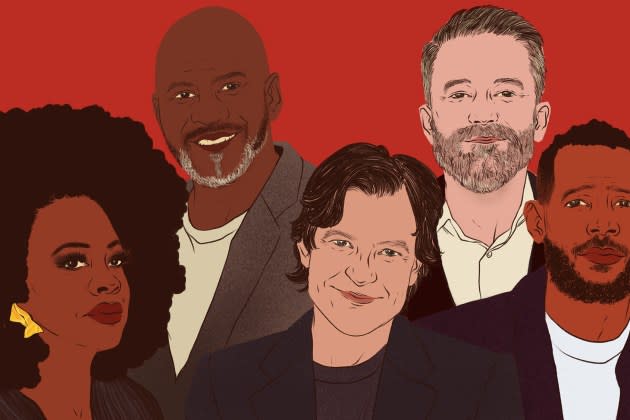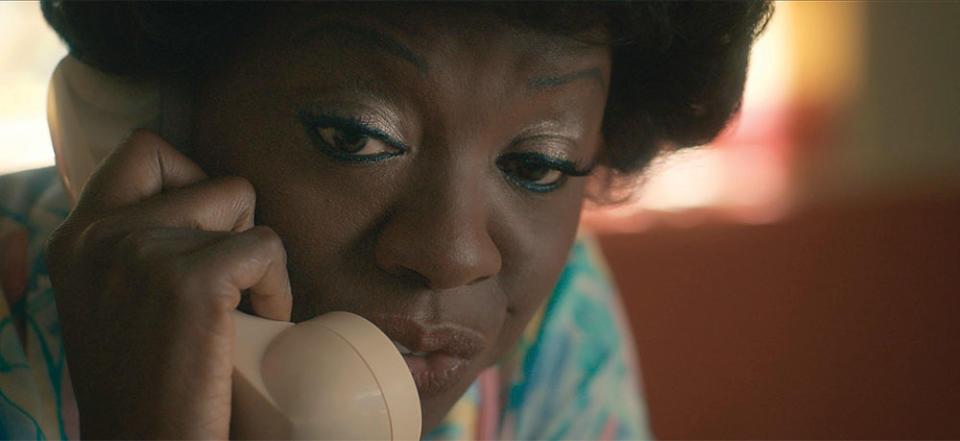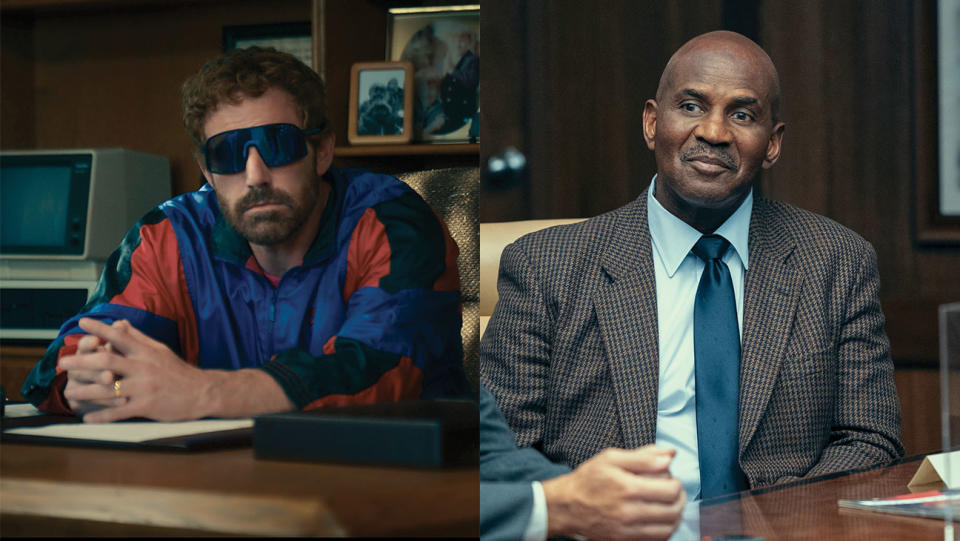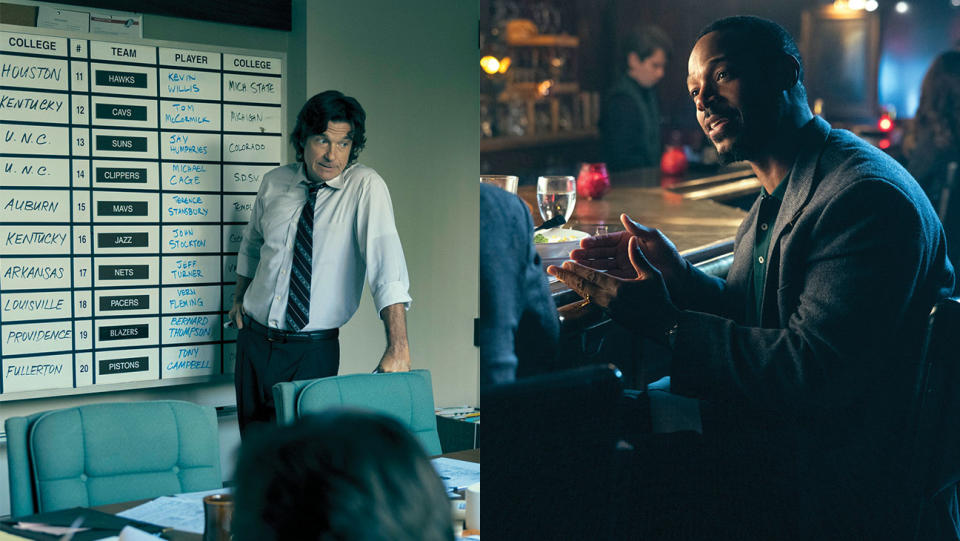‘Air’ Cast on the Secrets to Acting Opposite a Phone Receiver
- Oops!Something went wrong.Please try again later.
- Oops!Something went wrong.Please try again later.
- Oops!Something went wrong.Please try again later.
- Oops!Something went wrong.Please try again later.

Ben Affleck’s Air employs a large ensemble cast to tell the story of how Nike landed Michael Jordan and created the iconic Air Jordan line of shoes, with Deloris Jordan brokering a revolutionary deal for her son.
Affleck — who pulls triple duty as director, producer (via his newly formed Artists Equity with Matt Damon, who stars in the film as Nike exec Sonny Vaccaro) and actor, playing Nike CEO Phil Knight — joined his stars Viola Davis (Deloris Jordan), Julius Tennon (Michael’s father, James Jordan; also Davis’ husband), Marlon Wayans (Olympic basketball coach George Raveling) and Jason Bateman (Nike marketing vp Rob Strasser) to discuss acting opposite a phone receiver and fighting for what you are worth, onscreen and off.
More from The Hollywood Reporter
This is a large ensemble cast. What role were you most anticipatory of casting?
BEN AFFLECK Part of the genesis [of casting] was a conversation one afternoon with Michael Jordan. The conversation led to the meaning and significance of both his mother, his life and a lot of clarity around that. It was going to be Viola Davis or nobody else. That made it a pivotal casting choice. Matt and I spent a lot of time trying to make sure that the role is sufficiently interesting and complex so that Viola would even consider it. I thought my ace in the hole was that [it was] coming from Michael and that may mean more than me. (Laughs.) Once [Viola’s casting] happened, it felt very comfortable. I was blessed with so many other great actors. This is really a performance-driven movie where the directing is mostly about getting out of the way and letting the actors relax and be comfortable and bring their voice to it.
Viola, what was it about the role of Deloris Jordan that made you say yes?
VIOLA DAVIS That she was the closer. That she was instrumental in this deal. At first I said, “I know that they’re going to want me to play his mom.” I play a lot of moms. I said, “I can’t play another mother.” And then my manager said, “Oh, no, but she’s not just your average mom role, Viola.” And I think that that made me perk up. I liked the element of surprise. I liked that there was another character trait in her that would wake people up.
Julius, how did you approach playing James?
JULIUS TENNON For me, in this movie and playing James, I’m just thinking, “Listen, I’ve got a son who’s pretty good at playing basketball. I’ve got a mother who loves her son intensely, and what am I going to do? I’m going to support my wife. I’m going to support my son.”

Is it easier to play a married couple onscreen given your relationship off the screen?
DAVIS Well, it’s definitely different. (Laughs.) Whenever you’re playing a married couple onscreen, you get together with other actors and — this is not a form of criticism, it’s just an observation — in every single scene, it’s: “Let’s do something in our behavior that shows people we’re together.” So people are constantly kissing and holding hands. But you don’t do that, you’re just together. You have to just be. There’s something about that unspoken language of just being connected, even across the crowded room, that says: That’s your person. It would be very hard to do if he weren’t my husband, but because we were already married, we naturally could do that. So I wasn’t constantly fixing his shirt and kissing him.
TENNON We were just being ourselves.
Ben, when casting for George Raveling, what made you think of Marlon for the role?
AFFLECK When I was talking to Michael, I was like, “Well, what’s the guy like?” He said he was funny, and then he mentioned Marlon. Then, when he mentioned Marlon, I was like, “God, I wonder if he would do it.” I asked Jen[nifer Lopez, Affleck’s wife], “You know Marlon, what do you think?” She was like, “Call him! He’s really cool. Just tell him what you think and why you want him.” [I was like,] “No, of course. I was going to think of that, eventually.” Get advice from your wife.
MARLON WAYANS When he called me, he talked to me for literally 45 minutes. He was just rambling about character, and I was just like, “Bro, you had me at hello. When do you need me? What do I got to do? I’m there.”
Marlon, how did you prepare to play George?
WAYANS I had two days to prepare. Thank God for YouTube. But [the script] had the monologue, and what fascinated me was the monologue was real. George Raveling really owns the original “I Have a Dream” speech. [Editor’s note: Raveling volunteered at the March on Washington and was placed near the podium, and he asked for Martin Luther King Jr.’s paper copy of the speech as he was leaving the podium. This story is recounted in Air.] This was a real story that happened. That’s the thing that grabbed me. Sometimes you read something and it’s a small part and you’re like, “I don’t know.” And then there are really great small parts. I thought about Christopher Walken — he had this long monologue in Pulp Fiction about a watch. It was just one scene, but it was so good. I thought of it like that.

A lot of important and integral scenes in Air happen over the phone. Is it hard to have a landline as your scene partner?
JASON BATEMAN It’s just another one of the fun, little, weird, fake life crap we do. It’s not super difficult. Ben did a really cool thing with Matt and with Chris Messina when they were doing their fighting scenes, he put them on the phone together.
AFFLECK And with Matt and Viola. Everyone but you. I said, “You know what? Jason’s a pro. He’s going to be great.”
BATEMAN Well, I sound like a dial tone.
AFFLECK The crazy little scene that the movie turns on is Matt and Viola on the phone. And that was one where I was like, “Boy, the actors better be good.” Because sometimes [with phone scenes] you can feel a director trying to add all these things, like drop frames or blow up the highlights or they graphically want to represent something. Whereas the reality is that this is the big moment and it happens on the telephone, as a lot of odd things do. You get the job, or get into school, or somebody passes away, and you’re on the telephone. And that was really how it was, so rather than trying to gin up a bunch of stuff, I thought maybe it’ll feel real to people.
I was like, I’m going to have four cameras on Matt, four cameras on Viola, and we’re just going to play the whole scene. And then watching it on the monitors, it was such a gift because I realized that a lot of times we would actually want to cut to the person who’s not talking. Because there’s usually a tendency to cut to who’s talking on the phone. This scene is where Matt’s really supposed to be his most convincing. And I was watching Viola [listening], and there’s the moment where she’s on the phone and takes it away from her face.
TENNON That’s the moment right there.
AFFLECK I feel the story behind it. And I never would’ve had that if it was two people in a diner or wherever. She’s allowed to be who she is, not who she feels she needs to be to this person.
WAYANS That is my favorite moment in the entire movie. It was so badass. There was so much magic in that silence.
BATEMAN (To Davis) You said you wanted to convey something along the lines of: This person is not listening to me.
DAVIS This is a moment where I could say what I really want to say. Or, should I temper it? But it’s a white man rules sort of moment. That moment that we have 50 million times on the phone where I am telling you what I am worth and what my son is worth for the 50 millionth time. You sat with me a while ago and you told me you came to North Carolina because my son was worth something. Now, I’m coming to you trying to convince you that my son is worth something and then you’re going on and on. I don’t want to hear this. Now, the only reason why I put the phone down is because that’s the moment that I usually put the phone down in my own life. I think [Deloris] would just put down the phone to give herself breath, the breath to come back with enough courage to close the deal and to stay true to herself. That is always the hardest thing when you walk into any room and you negotiate as a woman, as a Black woman. When you’re going into the room and you’re just trying to convince someone that you’re just worth it. That’s it. And it’s a larger conversation. It’s a deeper conversation than just saying that, but that’s what that whole conversation is about, is that you said he was worth it.
BATEMAN It was writing through performance. That’s something Ben is so great at allowing for and including in the edit.
DAVIS Really quick, I really despise phone scenes. It’s like car scenes. What you learn in acting is being private and public. I think private things are sometimes very subtle, those things that you don’t want anyone to see. The rolling of the eyes when someone is saying something that they feel is really important and deep, but you don’t necessarily [think so]. Or even tearing up when you’re at home because you are thinking about a parent who’s passed or whatever. I saw the putting down a phone during a major negotiating conversation as an extremely private moment. I can imagine putting down the phone like that negotiating something with an agent. It’s something that no one would see. But when you see it on camera, there’s something about it that [makes you go], “Wow, OK.”

So much of Air is about worth and being properly compensated. The industry recently went through two strikes where compensation was at the center of negotiations. And Ben and Matt’s production company, Artists Equity, has a model that gives above- and below-the-line talent equity in a film. As performers, what was your response when Matt first pitched the idea of Artists Equity to you all?
BATEMAN Personally, I focused a lot on what he was saying about the crew and his ability to attract a really high level of department heads through financial incentives, yes, but it was mostly a conversation about recognizing what a team it takes and that that team should be properly compensated. And right now it is not. Culturally, it’s people who work the longest and the hardest on sets, some of them are paid the least. It’s something that’s been allowed to perpetuate because no one like Matt and Ben has really looked under the hood on that and spent the time.
TENNON That’s what makes it so beautiful with what Ben and Matt are doing, the fact that they care about people, the people who make it happen. The people who are not necessarily in front of the camera, and that means a lot.
AFFLECK Nobody who makes a movie that I really respect and admire cares more about money than they do about the movie. They want the movie to be great and they’re going to make it great. It’s the only business where it’s not supply and demand. It’s artists with ambition to be great and do something special that they can be proud of, which always matters more to people than what the paycheck is. That’s the truth. And there have been people who took advantage of it and who said, “Well, if you want to do a good movie, now we’ve got to cut your price.” It was like, wait a minute, hold on. It’s not just about money, it’s ownership and it’s respect. It’s saying, “I have a stake in this.” You are part of this. You do mean something. That’s why I thought the movie was thematically connected to the ideas behind the company.
This story first appeared in a December standalone issue of The Hollywood Reporter magazine. Click here to subscribe.
Best of The Hollywood Reporter
Eight Actors Who Have Played Willy Wonka in Films and on Broadway
Martin Scorsese’s 10 Best Movies Ranked, Including 'Killers of the Flower Moon'

